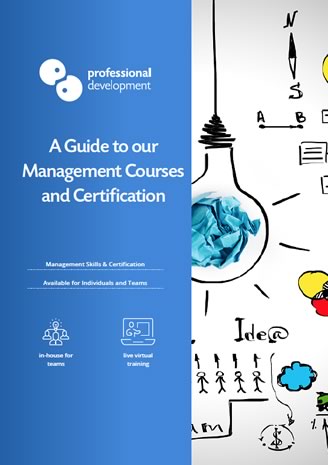As much as we all try to avoid it, conflict happens.
Even in the most well-gelled teams and positive work environments, conflict and difficult conversations will arise occasionally.
Managing conflict is a responsibility that falls on those in leadership roles. As a manager, your duty is to handle the situation as professionally and pro-actively as possible.
Managing Conflict & Difficult Conversations
Managing conflict and difficult conversations can refer to many different situations:
- It can mean mediating a dispute or clash between two or more members of your team.
- “Difficult conversations” can refer to addressing consistently poor performance with a member of staff.
- Occasionally, the “conflict” may be a tense situation or miscommunication between you and another team member.
There are not many people who can naturally handle these kinds of situation with ease.
Here are some tips and guidance that will help to support you as you navigate any tricky situations that crop up.
Don’t Try to Avoid it
When you spot a potentially awkward conversation or area of conflict, it is so tempting to cross your fingers and hope it just goes away.
Unfortunately, this approach usually makes things worse.
If you know there is a conversation you need to have or a situation that should be addressed, do it promptly.
By doing this, you will prevent the situation from spiralling out of control. You may even resolve it very quickly and easily. The phrase “nip it in the bud” could be very aptly applied here!
Keep it Discreet
Whether you need to discuss under-performance with a particular person or mediate an area of conflict between two team members, it’s important to handle the matter as discreetly as possible.
People prefer to discuss difficult matters with privacy. Scheduling 1-to-1 meetings with the person or people involved shows respect and will ease tensions a little.
If it’s a very sensitive situation, you may prefer to have a member of HR present too.
In a 1-to-1 situation, you’ll find that people speak more openly. This will help you make progress towards a solution more rapidly.
Get Tools to Support You
There are ways to manage these kinds of tricky conversations and techniques for addressing very sensitive subjects.
You’ll need to possess these sharp communication skills when managing conflict.
That’s why we include the following modules on both our certified and uncertified management courses:
- communication & assertiveness
- managing performance
- managing conflict and tricky situations
By attending training, gaining the required knowledge, and benefitting from the experience of a seasoned management training professional, you’ll be equipped with a solid set of skills for handling the most delicate of conversations.
Learn more
Management Skills – 2 Days – Practical Skills
This 2-day course covers all 3 modules on communication and difficult conversations mentioned above.
Read more about this course
QQI People Management – 3 Days – QQI Certification & Practical Skills
In addition to the 3 modules above, this course has focused modules on:
-
– coaching your team
– values, cultures, and attitudes
– legislation, equality & diversity
These extra modules will also support you when handling challenging situations within your team.
Read more about this course
Be Clear and Consistent
Although it’s crucial to be sensitive and where appropriate, sympathetic, it is equally important that you are very clear and consistent in your approach to managing conflict.
Be clear in communicating your questions, expectations, and suggested resolutions throughout.
Be consistent in how you handle all forms of conflict so that your team knows what to expect.
Remember, it takes Practice
Handling difficult situations and conversations is never easy. What’s more, it takes practice to become confident navigating these tricky waters.
You may find that your first few encounters don’t run as smoothly as you hope. Don’t be discouraged; it will get better!
The most solid advice we can offer is to equip yourself with the appropriate skills and devise a policy for handling conflict early on.
Once you begin from this stance, you’re in an excellent position to reach a fair and favourable outcome.


